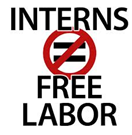 In the vast majority of instances, internships in the “for profit non-government sector constitute employment. As a result, an individual must be paid for all hours for which she/he provides services. In limited instances, internships may qualify for being treated as non-employment. In these instances, interns do not have to be paid.
In the vast majority of instances, internships in the “for profit non-government sector constitute employment. As a result, an individual must be paid for all hours for which she/he provides services. In limited instances, internships may qualify for being treated as non-employment. In these instances, interns do not have to be paid.
• For this to be the case, there are six criteria from the U.S. Department of Labor that must be met.
• All six of the criteria must be met for the intern not to receive pay.
➡ The federal government’s position clearly leans toward interns are not free labor.
Interns in the “for-profit” non-government sector who qualify as employees rather than interns or trainees must be paid at least the minimum wage and overtime compensation (at 1 & ½ times their regular rate of pay) for any hours worked over forty in a workweek. Here’s two examples of the six criteria:
- The internship is similar to training which would be given in an educational environment.
- The employer that provides the training derives no immediate advantage from the activities of the intern; and on occasion its operations may actually be impeded.
Trying different http://mouthsofthesouth.com/viagra-7115 viagra on line sex positions can help in introducing brief interruption between lovemaking sessions to relax and restore equilibrium.
RECOMMENDED EMPLOYER ACTION If you have interns or are planning to utilize interns at the end of the college school year:
- Evaluate the specifics of your internship.
- If you are not paying interns/do not plan on paying interns, ensure the internships meets all six Department of Labor qualifications in order for the internship to be in regulatory compliance .
If your organization needs help with the issue of internships, Trinity’s Team of Consultants can provide assistance expertly and economically.
• For more information, e mail Trinity at info@TrinityHR.net or visit our website at www.TrinityHR.net.
You have questions…Trinity has answers.